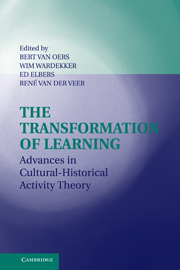Book contents
- Frontmatter
- Contents
- List of Contributors
- Preface
- INTRODUCTION
- SECTION ONE TENETS OF ACTIVITY THEORY
- SECTION TWO IDENTITY, DIVERSITY, AND INCLUSION
- SECTION THREE DYNAMICS OF ACTIVITY AND THE VARIATIONS OF LEARNING
- Introduction to Section Three: Learning in Social Settings: Challenges for Sociocultural and Activity Theory
- 15 Children's Learning through Participation in Institutional Practice: A Model from the Perspective of Cultural-Historical Psychology
- 16 Dialogue for Reasoning: Promoting Exploratory Talk and Problem Solving in the Primary Classroom
- 17 What Kinds of Tools and Resources Are Made Available to Students through Effective Guidance in a Student-Scientist Partnership Program?
- 18 Girls on the Sidelines: “Gendered” Development in Early Childhood Classrooms
- 19 Inscripting Predicates: Dealing with Meanings in Play
- 20 Pretend Play and Preschoolers
- Index
- References
19 - Inscripting Predicates: Dealing with Meanings in Play
Published online by Cambridge University Press: 25 August 2009
- Frontmatter
- Contents
- List of Contributors
- Preface
- INTRODUCTION
- SECTION ONE TENETS OF ACTIVITY THEORY
- SECTION TWO IDENTITY, DIVERSITY, AND INCLUSION
- SECTION THREE DYNAMICS OF ACTIVITY AND THE VARIATIONS OF LEARNING
- Introduction to Section Three: Learning in Social Settings: Challenges for Sociocultural and Activity Theory
- 15 Children's Learning through Participation in Institutional Practice: A Model from the Perspective of Cultural-Historical Psychology
- 16 Dialogue for Reasoning: Promoting Exploratory Talk and Problem Solving in the Primary Classroom
- 17 What Kinds of Tools and Resources Are Made Available to Students through Effective Guidance in a Student-Scientist Partnership Program?
- 18 Girls on the Sidelines: “Gendered” Development in Early Childhood Classrooms
- 19 Inscripting Predicates: Dealing with Meanings in Play
- 20 Pretend Play and Preschoolers
- Index
- References
Summary
PLAY AND MEANINGS
One of the recurrent issues in the debate about humanity and cultural development is the phenomenon of play. Despite this perpetual attention of philosophers, educators, psychologists, and pedagogues to the element of play in human activities, there is still much controversy about the conceptualisation of the relationship between play and human cultural development. In his famous study of the role of play in human cultures, Homo Ludens, the Dutch historian of culture Johan Huizinga investigated many cultures from antiquity until the beginning of the twentieth century and concluded that play is most certainly the basis for all human culture. Institutions such as the law, constitutions, art, crafts, science, sport, and trade are basically rooted in human playful activities (Huizinga, 1938). “Human civilisation,” he writes, “emerges and develops in play, as play.” In his analysis he stipulates that play has a culture-creating function, and the major determinant in this process is the element of competition, which is intrinsic to all playful activities. In this competition, new or modified meanings are attributed to familiar objects and actions, which subsequently become the basis for new objects and actions.
It is interesting to note that in the beginning of the twentieth century this connection between play and human cultural development was made independently by many academics at different places. For Bakhtin (1964/1994), for example, the element of play was essential for cultural innovations.
Information
- Type
- Chapter
- Information
- The Transformation of LearningAdvances in Cultural-Historical Activity Theory, pp. 370 - 379Publisher: Cambridge University PressPrint publication year: 2008
References
Accessibility standard: Unknown
Why this information is here
This section outlines the accessibility features of this content - including support for screen readers, full keyboard navigation and high-contrast display options. This may not be relevant for you.Accessibility Information
- 4
- Cited by
